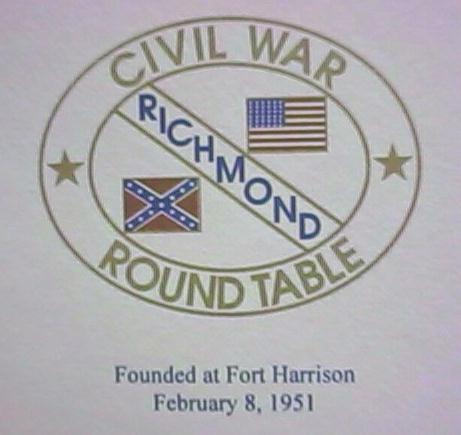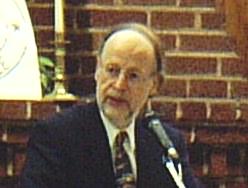


October 2001
Sam Craghead, President Art & Carol Bergeron, Editors 4361F Lakefield Mews 3901 Paces Ferry Road Richmond, VA 23231 Chester, VA 23831-1239 October 2001 PROGRAM Dr. Art Bergeron "Henry Heth in the Petersburg Campaign" 8:00 p.m., Tuesday, October 9, 2001, at the Boulevard United Methodist Church, 321 N. Boulevard, Richmond, VA (corner of Boulevard and Stuart Ave.) Dr. Art Bergeron is the Historian at Pamplin Historical Park & The National Museum of the Civil War Soldier. He has held this position since May 1996. Bergeron received his master's and doctoral degrees in American history from Louisiana State University, where he studied under the late Dr. T. Harry Williams and Dr. William J. Cooper, Jr. A native of Louisiana, Bergeron worked as historian at the Port Hudson State Historic Site and as Chief of Interpretive Services for Louisiana State Parks before moving to Virginia. He is the author, co-author, or editor of nearly a dozen books. Among them are Guide to Louisiana Confederate Military Units, 1861-1865 (LSU Press, 1989); Confederate Mobile, 1861-1865 (University Press of Mississippi, 1991); and The Civil War Reminiscences of Major Silas T. Grisamore, C. S. A. (LSU Press, 1993). The two latter titles were selections of the History Book Club. Bergeron has written articles and essays for dozens of scholarly journals and compiled works such as Encyclopedia of Confederate History and The Confederate General. He is a past president of the Louisiana Historical Association and is an active member of the Society of Civil War Historians, Southern Historical Association, and the Blue & Gray Education Society. The subject of Bergeron's presentation, Henry Heth, was a native of Chesterfield County. Heth is perhaps best known among Civil War enthusiasts as a division commander in General Robert E. Lee's Army of Northern Virginia and whose troops brought on the Battle of Gettysburg on July 1, 1863. During the Petersburg Campaign, 1864-1865, Heth and his division played a pivotal role in the defense of the Cockade City. Bergeron will give an overview of those operations and present an analysis of Heth's generalship. Those nine and a half months were, in many ways, Henry Heth's finest hours.
Review of the September ProgramDr. Richard McMurry presented a provocative and entertaining look at the Atlanta Campaign of 1864. A native of the Atlanta area, McMurry had an early interest in those operations and wrote a paper on the subject while attending the Virginia Military Institute. His talk was based upon his most recent book, Atlanta 1864: Last Chance for the Confederacy. In his opening remarks, McMurry stated that there have been three basic questions about the Civil War: what caused it, what were its results, and why did the side that won it succeed (or why did the Confederacy lose). He mentioned some of the answers given to those questions by historians over the years but dismissed almost all of them. The South lost, he said, because Confederate armies lost the battles. Although the Confederacy won many battles in Virginia, it lost the war because its armies lost most of the battles it fought in the Western Theater. Of the western campaigns, one of the most crucial to Northern victory was the Atlanta Campaign. By early 1864, it seemed clear that the Confederates could not win a military victory. They had to hold out and erode the North's resolve to keep fighting-win by not losing. One of their best opportunities was the presidential election of 1864, in which Abraham Lincoln might be defeated. The Confederates could help insure that defeat in northern Georgia, where General Joseph E. Johnston's Army of Tennessee faced three Union armies led by Major General William T. Sherman. If Johnston could stall Sherman's advance and protect Atlanta, Lincoln might lose to George B. McClellan. According to McMurry, Lincoln made his worst blunder of the war by ordering Ulysses S. Grant to Virginia. This decision took the Union's best general out of the area where he was winning and put him in an area where the Confederates might nullify his strengths as a general. In the West, Grant might have ended the war by July 4. A second part of Lincoln's mistake was replacing Grant with Sherman. George H. Thomas would have made a better choice and might well have won the campaign more quickly than Sherman did. Johnston essentially lost the campaign in early May 1864 when he failed to protect Snake Creek Gap and allowed Sherman's armies to force him out of his positions at Dalton. The latter resembled the Union position at Gettysburg in its shape and strength. Johnston failed to fortify the southern end at Snake Creek Gap and then permitted Union troops to capture it without significant opposition. From that point onward, Johnston followed a totally passive strategy, retreating from one position to another with enormous significance to the fate of the Confederacy. The retreat was a logistical, political, and psychological disaster. Jefferson Davis was justified in removing Johnston in July 1864 and replacing him with John Bell Hood. The latter found himself in an impossible situation. His defense of Atlanta was not that bad and has never been fully evaluated, McMurry stated. Hood's generals were largely responsible for failing to carry out Hood's plans. When his last supply line was finally cut in late August, Hood had no choice but to abandon Atlanta. McMurry clearly placed responsibility for the fall of Atlanta upon the shoulders of Joseph E. Johnston. His continual retreats cost the Confederacy the campaign. The capture of Atlanta was a huge factor in Lincoln's re-election. There was no doubt of the war's outcome after that.
Announcements
Round Table Raffle The raffle item for October will be Richmond at War: The Minutes of the City Council, 1861-1865, by Louis H. Manarin. Dr. Manarin has donated the book for preservation.
Symposium Announcement Pamplin Historical Park in Petersburg announces its Fifth Annual Civil War Symposium, "The Politics of War," October 20-21. This program brings together some of the nation's foremost scholars on the politics of the Civil War. Their presentations will lead to a greater understanding of that aspect of the conflict. The speakers and their topics are as follows: Dr. John Y. Simon, Executive Director of The Ulysses S. Grant Association and Professor of History at Southern Illinois University, "Lincoln as Commander in Chief: Blending Political and Military Goals;" Dr. William J. Cooper, Jr., Boyd Professor of History at Louisiana State University, "Jefferson Davis and States Rights in the Confederacy;" Dr. Thomas E. Schott, Historian, United States Air Force, "Alexander H. Stephens;" Dr. Paul H. Bergeron, Professor of History at the University of Tennessee, "The Three Lives of Andrew Johnson: Senator, Governor, and Vice President;" and Dr. George C. Rable, Charles G. Summersell Professor of History at the Universi f Alabama, "What Can Be Learned from the History of a Christian Slaveholders' Republic?" The symposium will include a tour of Civil War Richmond, with stops at Belle Isle, Hollywood Cemetery, the State Capitol, and the National Park Service's Tredegar Civil War Visitor Center. For more information, call Pamplin Historical Park at (804) 861-2408 or visit the park's Web site: http://www.pamplinpark.org.
Civil War Richmond Program The Civil War Education Association will sponsor "Civil War Richmond-Then and Now" on November 2-4. This tour program will explore the sites that bridged the gap between the battles at Spotsylvania and Cold Harbor and will be led by Robert E. L. Krick. Stops on Saturday will include Carmel Church, Henagan's Redoubt, Ox Ford, Hanover Junction, Mangohick Church, "Wyoming," Haw's Shop, and Shelton House. The Sunday program will be a combination bus and walking tour of Civil War sites in downtown Richmond, including Capitol Square, Monumental Church, and the site of the house where Jeb Stuart died. A deposit of $50 for the program is required. For more information, write Civil War Education Association, P. O. Box 78, Winchester, VA 22604; phone 800-298-1861; fax 800-550-1347; or e-mail cwea@mnsinc.com. A block of rooms has been reserved at the Wyndham Hotel Richmond Airport, and a special rate is available. Call them at 804-226-4300 and identify yourself as a registrant for the CWEA program.
Civil War Round Table Holiday Party The Richmond Civil War Round Table annual holiday party will be held on Tuesday, November 13, 2001, at the Willow Oaks Country Club at 6228 Forest Hill Avenue. Our speaker is Ms. Virginia B. Morton who will give a presentation on her recent book Marching Through Culpeper: A Novel of Culpeper, Virginia, Crossroads of the Civil War. The schedule for the evening is as follows: 6:00 p.m. (Cocktails - Cash Bar) 6:30 p.m. (Dinner) 7:45 p.m. (Business) 8:00 p.m. (Speaker) The cost for dinner is $23.00 per person and includes an entree, house salad, vegetables, dessert, ice tea and coffee. Please send all checks by November 6, 2001 payable to: Richmond Civil War Round Table c/o Clark H. Lewis (1111 E. Main Street) P. O. Box 1122 Richmond, Virginia 23218-1122 If you have questions, please contact Clark Lewis at 697-1474 or clark.lewis@troutmansanders.com
Richmond Civil War Round Table Newsletter Art & Carol Bergeron, Editors 3901 Paces Ferry Road Chester, VA 23831-1239
Return to News Letters Index
Return to main page

©R.C.W.R.T. 2000-2001
